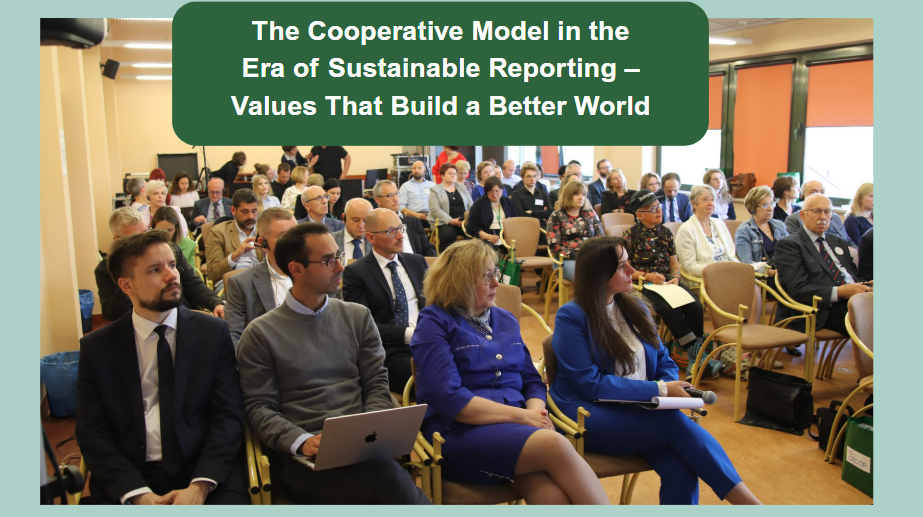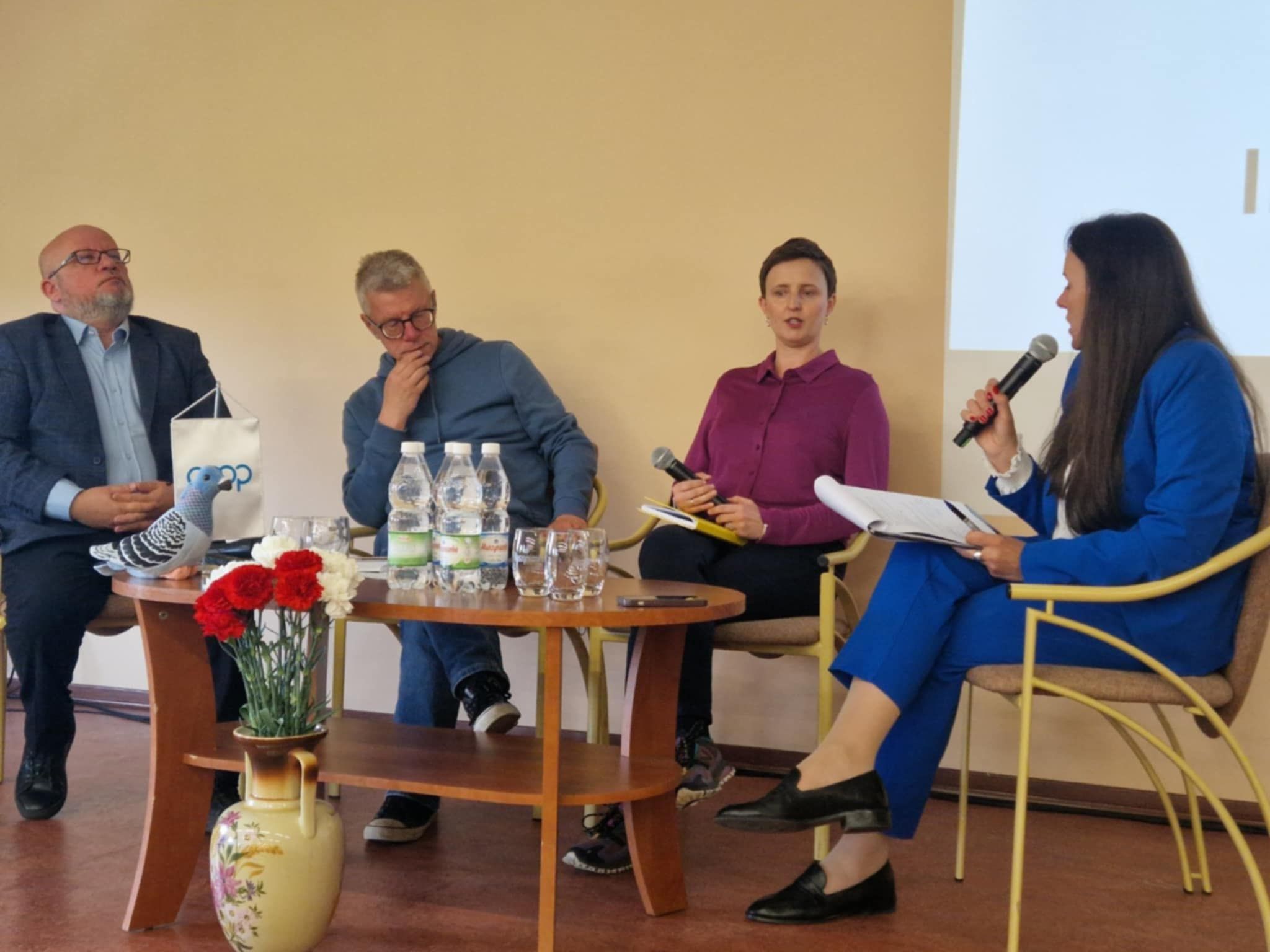
The seminar, co-organised by CECOP, and our Polish members, NAUWC (the National Auditing Union of Worker Cooperatives), and OZRSS (National Auditing Union of Social Cooperatives), was an integral part of the United Nations International Year of Cooperatives 2025. In the context of its global theme “Cooperatives Build a Better World”, the seminar focused on the role of cooperatives in advancing sustainable practices, and the practices implemented to measure and report on these, particularly in the face of increasing sustainability reporting obligations.
|
|
The event was opened by NAUWC President Janusz Paszkowski and CECOP President Giuseppe Guerini, who underlined the distinctive characteristics of cooperatives and the need to report on the added value cooperatives generate.
Elisa Bevilacqua, Senior Technical Manager at EFRAG, presented the Voluntary Sustainability Reporting Standard (VSME), which was developed for SMEs that fall outside the scope of the CSRD. While the VSME is a voluntary initiative, it allows SMEs, including small and medium cooperatives, to standardise their sustainability information. It is particularly useful for these enterprises as reporting obligations that large companies face may trickle down to their business partners, including small and medium cooperatives. Moreover, these enterprises may be asked to provide sustainability reporting by banks and investors, and the VSME may also facilitate their access to sustainable finance.
“It is important to exchange best practices, to learn from each other, to take stock of the tools we have and build upon them, to then show others what we already know: that the cooperative movement is built on values and principles that emphasise sustainability, social responsibility, and democratic governance.” – CECOP Secretary General Diana Dovgan
CECOP Secretary General Diana Dovgan provided an overview of recent trends in ESG (environmental, social, governance) reporting, including the role of the United Nations Sustainable Development Goals and EU legislation, from the Non-Financial Reporting Directive of 2014 to the Corporate Sustainability Reporting Directive, adopted in 2022. In light of the increasing obligations to report on sustainability, cooperatives are well-positioned to adapt to these changing requirements as they have a history of monitoring their impact and their social, environmental, and governance issues. From the cooperative audit – a process that ensures the proper functioning of cooperatives and guarantees that they abide by the cooperative principles and any specific national laws applicable to them – to the Italian bilancio sociale, the French bilan societal, and the Spanish balance social, cooperatives have developed various tools and practices to test and validate their social and environmental impact, to ensure accountability, and to improve their impact in terms of environmental sustainability and social responsibility.
To underline this, speakers from Italy and Spain presented the practices of their organisations: Consorzio Nazionale Servizi (CNS) from Italy and Mondragon Corporation from Spain. Francesca Zarri, from Consorzio Nazionale Servizi, which consists of 11 cooperatives in the service sector, introduced the approach of the consortium to integrate sustainability into their strategic planning. She underlined the importance of measuring social impact and integrating ESG into all areas of their work. In particular, inspired by the UN Sustainable Development Goals and the cooperatives principles as outlined by the International Cooperative Alliance, CNS has developed a matrix which is integrated in the work of the consortium. She also emphasized the need for exchanging with members, and working together to increase their sustainability, and environmental and social impact.
Jon Olaizola Alberdi, PhD Candidate at Mondragon University, associated to the Mondragon Corporation, explained that the Mondragon business strategy is social, sustainable, and economic. In fact, Mondragon’s new Socio-Business Policy (2025-2028) includes sustainability not only as a value, but as a strategic pillar, and it calls for the full integration of ESG into the core of the business strategy for all cooperatives in the Mondragon Corporation. He underlined that sustainability is a key factor for competitiveness, long-term impact, and legacy. Crucially, the current trends in the EU in terms of sustainability reporting, such as the CSRD, do not reflect the specific value creation of the cooperative model, and there is a risk that these reporting obligations that set out universal frameworks can lead to making the added value of cooperatives invisible. It is necessary to work together within the cooperative movement, and tackle the complexity of sustainability reporting collectively.
“For cooperatives, sustainability is not a checkbox — it is rooted in our purpose, our people, and our territories.” - Jon Olaizola Alberdi, PhD Candidate at Mondragon University

The seminar closed with a roundtable discussion among Cezary Miżejewski, President of OZRSS, Julia Koczanowicz-Chondzyńska, President of Fundacja Inicjatyw Społeczno-Ekonomicznych, and Rafał Krenz Director of Cooperation and Innovation at PLZ Spółdzielnia /CoopTech Hub. They discussed the challenges and opportunities for cooperatives in the context of sustainability reporting. The speakers agreed that it is necessary for cooperatives to start reporting on their ESG issues, and that there is no time to wait for top-down regulations on reporting requirements. They also highlighted that ESG is a way to build social resilience; it is not just reporting, but preparation for future crises.
 This event is co-funded by the European Union. Views and opinions expressed are, however, those of the authors only and do not necessarily reflect those of the European Union or the European Commission. Neither the European Union nor the granting authority can be held responsible for them.
This event is co-funded by the European Union. Views and opinions expressed are, however, those of the authors only and do not necessarily reflect those of the European Union or the European Commission. Neither the European Union nor the granting authority can be held responsible for them.







 Employment & Social Inclusion
Employment & Social Inclusion  Entrepreneurship
Entrepreneurship Sustainable Growth
Sustainable Growth 

